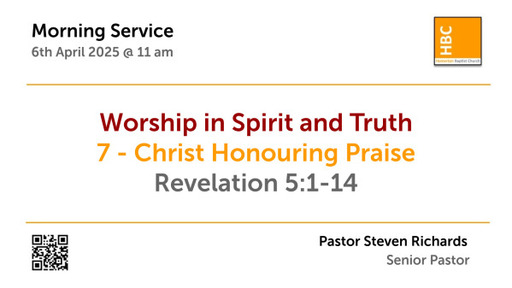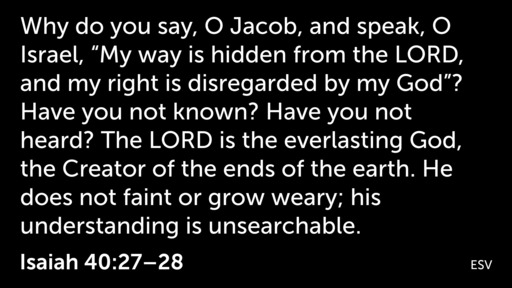April 6th 2025 - Babel to Abram
Sermon • Submitted • Presented
0 ratings
· 2 viewsNotes
Transcript
Outline
Outline
Title: “Scattered & United: The Tower of Babel & the Kingdom of God
In the 1940s, billionaire aviator Howard Hughes set out to build the largest airplane the world had ever seen. It was called the Spruce Goose, though it wasn’t made of spruce at all—it was birch. Built during World War II, the idea was to create a massive flying transport that could carry troops and supplies safely across the Atlantic, avoiding German submarines. Hughes poured his money, time, and reputation into the project.
After nearly a decade of work and over $23 million spent—equivalent to hundreds of millions today—the moment finally arrived. The plane was ready. Crowds gathered. Reporters watched. And on its first and only flight, the mighty aircraft lifted into the air...
…for 26 seconds.
That was it. It never flew again. Hughes had built the largest plane in the world, but it was already obsolete. The war was over. What was meant to be his greatest achievement became a monument to wasted ambition.
Thousands of years earlier, a different group of people set out to build something massive—a tower reaching to the heavens. They, too, had resources, unity, and a grand vision. But their goal wasn’t just to build a structure; it was to make a name for themselves—to establish their own security apart from God.
But just like the Spruce Goose, their project wouldn’t last. God came down, confused their language, and scattered them. What they thought would be their greatest achievement became the beginning of their downfall.
Like worship, we are all in the process of construction. Some of us are in the demo phase as walls are being torn down. Others are in a build up phase. Others still are in a ‘need of repair’ phase. But all in the process of building.
So today, I want to ask: What are we building? Are we climbing, building toward God, or are we building a tower for ourselves that won’t last? Let’s turn to Genesis 11 and see what the Tower of Babel has to teach us.
I. RECAP
I. RECAP
Last week, Pastor Michael walked us through a good amount of Genesis 9 and Genesis 10 giving us a genealogy of Noah’s descendants after the flood. It lists the nations that came from Noah’s three sons—Shem, Ham, and Japheth—and describes how they spread out across the earth. At first glance, it seems like humanity is obeying God's command in Genesis 9:1 to "be fruitful and multiply and fill the earth."
But then we get to Genesis 11 and it zooms in and gives us the backstory. Instead of spreading out as God commanded, the people choose to settle in one place and build a tower to make a name for themselves. Starting in chapter 11, verse 1.
1 Now the whole world had one language and a common speech. 2 As people moved eastward, they found a plain in Shinar and settled there.
3 They said to each other, “Come, let’s make bricks and bake them thoroughly.” They used brick instead of stone, and tar for mortar. 4 Then they said, “Come, let us build ourselves a city, with a tower that reaches to the heavens, so that we may make a name for ourselves; otherwise we will be scattered over the face of the whole earth.”
I. The Illusion of Human Unity (Genesis 11:1-4)
I. The Illusion of Human Unity (Genesis 11:1-4)
In so many ways, there is the shimmer of a beautiful picture right? It feels like the culmination of the story….as all of the folks from Shem, Ham, and Japeth, the descendents of Noah’s sons living life.
In my mind, I imagine the end of a movie where the people have gone through great adversity…in our case…a flood that destroys every creature with the breath of God, a 600 year old drunk naked man, and a curse on the grandson who would father some of Israel’s biggest enemies later in the story.
In the movie, there would be a charismatic pep talk, and they begin to work together towards one goal. In many ways, this is a picture of unity that all of us enjoy at differing times.
It says they had one language, a common speech. If you want a fun friday night, jump down the rabbit hole of the different theories around the beginning and progression of language. While I am no expert in that field, what I would say is that…when we start asking questions “how did humanity develop language”, we are already leaving God out. In the beginning God spoke to Adam, and Adam understood him. Then Adam gave names to the animals. Adam spoke to His wife Eve. There is language from the very beginning. However it developed, it originated from God.
They had one speach, one language. This is conveying a sense of unity. Humanity's unity isn’t the problem—their purpose for unity is.
“Now the whole world had one language and a common speech.”
This unity was a gift from God, but see the problem that ruins this end of movie picture.
Problem: Their unity became self-serving—not about worshiping God, but about securing power. Making a name for themselves. We will get to that in a minute.
2. Post-Flood Disobedience – Settling Instead of Spreading (v. 2)
2. Post-Flood Disobedience – Settling Instead of Spreading (v. 2)
God told Noah and his descendants: “Be fruitful and multiply, and fill the earth” (Gen. 9:1).
But instead of obeying God's command to spread out, they settled in Shinar (Babylon).
Big Picture: This is the same sin as Eden—distrusting God’s plan and trying to take control.
3. The City & The Tower – The First Human Project (vv. 3-4)
3. The City & The Tower – The First Human Project (vv. 3-4)
A City for Safety: They believed strength came from numbers, not from God.
A Tower for Significance: They weren’t just building a city—they were building a monument to their greatness.
“Let us make a name for ourselves.” (v. 4)
They wanted identity, security, and power apart from God.
Contrast: In Genesis 12, God gives Abraham a name ("I will make your name great," Gen. 12:2).
Babel = Self-glory, Abraham = God-given identity.
4. Babel as a Counterfeit Eden
4. Babel as a Counterfeit Eden
Babel was an attempt to build their own version of paradise—a world without dependence on God.
Key Problem: Any attempt to build security, identity, or meaning apart from God will ultimately crumble.
Illustration: The Spruce Goose—Hughes poured everything into it, but it never truly accomplished what it was meant for.
Formation Question: Where do I build for myself rather than trust God?
Formation Question: Where do I build for myself rather than trust God?
Where am I seeking control, security, or a name for myself apart from Him?
Am I settling when God has called me to trust and move?
II. God’s Loving Intervention (vv. 5-7)
II. God’s Loving Intervention (vv. 5-7)
“The Lord came down to see…”
Satire: Their mighty tower is so small, God has to “come down” to even see it.
God isn’t threatened—He’s concerned.
Why does God confuse their language?
Not punishment—protection.
If they keep going, their pride will destroy them.
This is divine mercy disguised as disruptio
Scattered & United: The Tower of Babel & the Kingdom of God
Text: Genesis 11:1-10
I. The Illusion of Human Unity (Gen. 11:1-4) – Babel’s Self-Made Security
Main Idea: Humanity’s unity isn’t the problem—their purpose for unity is.
One Language, One Speech – A False Sense of Strength (v. 1)
“Now the whole world had one language and a common speech.”
Their unity was self-serving—not about worshiping God but securing power.
Settling Instead of Spreading – Disobedience After the Flood (v. 2)
God commanded Noah’s descendants to “fill the earth” (Gen. 9:1).
Instead, they stayed together, seeking their own security.
A City for Safety, A Tower for Significance (vv. 3-4)
“Let us make a name for ourselves.” (v. 4)
Contrast: They try to make their own name, but in Genesis 12:2, God tells Abram, “I will make your name great.”
Babel as a Counterfeit Eden
Babel is about self-glory; Abram’s calling is about trusting God.
The people at Babel built up toward God; God tells Abram to go out in faith.
Key Question: Where do I try to build my own security apart from God?
II. God’s Loving Intervention (Gen. 11:5-7) – Scattering to Save
Main Idea: God’s disruption is often His mercy in disguise.
God Comes Down (v. 5) – The Tower is Small to Him
Satirical—what looked so grand to humans is tiny in God’s eyes.
God’s Concern: Pride Will Destroy Them (vv. 6-7)
God isn’t threatened—He’s protecting them from themselves.
Disrupting their plans is an act of mercy.
Babel’s Confusion vs. Abram’s Clarity
Babel’s people are confused and scattered; Abram is given clear direction (Gen. 12:1-3).
Instead of prideful control, Abram must trust in God’s promises.
Formation Question: Where has God disrupted my plans for my good?
III. Scattered for Mission (Gen. 11:8-10) – From Babel to Abraham to Pentecost
Main Idea: God’s plan was always about gathering a people—not by human effort, but by faith.
The Irony of Babel – Scattered Anyway (v. 8)
The Irony of Babel – Scattered Anyway (v. 8)
They tried to avoid scattering, but God scatters them anyway.
Abram’s Calling (Gen. 12:1-3) – A New Start
The world was scattered, but God chooses one man to begin a new nation.
“Through you, all nations will be blessed.” (Gen. 12:3)
Abram is called to go by faith instead of build by pride.
From Babel to Pentecost (Acts 2) – Language Divides, Then Unites
Babel: Language confused → People scattered
Pentecost: Languages understood → People gathered under Christ
Babel was about human control; Pentecost was about God’s Spirit moving freely.
Babel = Babylon (Rev. 18) – The Final Worldly Kingdom
Babel represents the kingdom of man, which appears again as Babylon in Revelation.
But God’s kingdom is built by faith, not human ambition.
Formation Question: Am I building Babel or the Kingdom of God?
Formation Question: Am I building Babel or the Kingdom of God?
Conclusion: Jesus & The Better City
Conclusion: Jesus & The Better City
Jesus isn’t calling us to build towers; He’s calling us to be temples. (1 Cor. 3:16)
We don’t need to make a name for ourselves—God gives us a name. (Isa. 43:1)
The Kingdom of God isn’t built by control but by surrender.
Just like Abram, we’re called to trust in God’s promise, not our own plans.
ADVERTISEMENT
Related Media
See moreRelated Sermons
See more

Homerton Baptist Church • 0 views • 29:09


Homerton Baptist Church • 3 views • 24:30


South Charlotte Baptist Church • 3 views • 40:23



